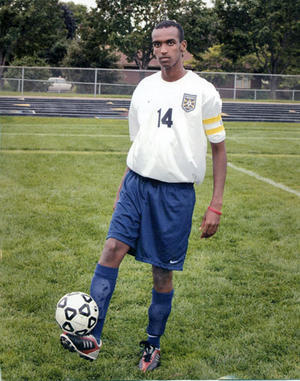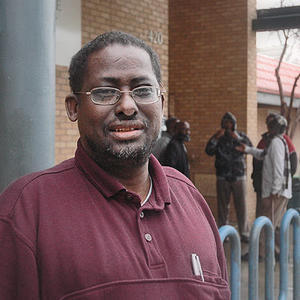fiogf49gjkf0d
Continued from page 2...

By Erin Carlyle
Tuesday, November 11, 2008
 |
| Augsburg College student Ahmednur Ali aspired to become president of Somalia one day, but instead his life was cut short. He was murdered after volunteering at Brian Coyle Community Center. |
Arie Musse Jama was his legal name, but almost everybody called him "Snoop." He liked to rap, and had a long, lean build like his namesake. Also like his namesake, Snoop had an extensive rap sheet. By the time he was 27, he'd been arrested by Minneapolis police 46 times, mostly for drug possession but also for assault and robbery. Snoop had been an early member of the Rough Tough Somalis, and the community viewed him as a gang member (though his family says he was not)..
Najib, 25, was Snoop's distant relative and had moved to Minneapolis three years before. It's thought that he was the true target of the crime, and Snoop was killed so as not to leave any witnesses, an unfortunate casualty of his friendship. Rumor about what happened that night traveled fast, and within hours the Somali community had a story and a suspect: Najib had quarreled with another Somali over a girl they'd both dated, according to the gossip. Words escalated into a fistfight, and the loser planned his revenge. That night at the Pleasant Avenue house, the killer rescued his honor by shooting first Najib, then Snoop.
Somalis pegged the primary suspects as two troubled men with criminal records and bad reputations in the community. Rumor spread quickly, and now nearly everyone seems to believe that one particular man did the killings—though police have not charged him with the crimes.
In the months after the double homicide, Snoop's brother, 31-year-old Mohamed Jama, whom everyone called "Nurki," made no secret of his suspicions. "I know you guys did it and you're not going to get away with it," he was heard to threaten more than once, according to a family member who asked not to be named for fear of retaliation.
Like Snoop's, Mohamed's past was stained by run-ins with the law, but by most accounts he'd turned his life around. He was married and had a three-year-old daughter, and worked as a basketball coach and youth mentor at Brian Coyle. But his good deeds couldn't save him; seven months after Snoop was murdered, Mohamed was shot dead in the back of the head outside a Brooklyn Center hotel. Plenty of people were around when he died, but no one would talk. Nurki's family thinks he was probably killed because of something to do with Snoop. "They were afraid of him," says one of Snoop's relatives, adding, "I cry a lot."
The violence continued. Five months after Snoop and Najib died, an 18-year-old kid was shot through the head. Little Abdillahi Awil Abdi, or "Shorty," as he was known, was a senior at Volunteers of America High School in Minneapolis. On April 11, Abdillahi played hoops at Brian Coyle, then walked a few blocks to meet a friend behind the Freewheel Bike shop on Sixth Avenue just off Cedar. They planned to go to a birthday party. Abdillahi got into the car at about 9 p.m. Another car pulled into the alley. A gunman stepped out. He opened Abdillahi's door and fired several times. Little Abdillahi slumped dead in his seat.
 |
| Saeed Osman Fahia, the unofficial historian of Somalis in Minnesota, understands the social factors that have led to violence among Somali youth |
Though his life was taken by violence, Abdillahi had nothing to do with gangs or crime. He had a good reputation in the community and a clean record. Rumor says the killer was looking for one of Abdillahi's older brothers. When he found Abdillahi he killed him instead. Police say the suspect has fled the country.
As fast as gossip spreads on the streets, it collected in online chat rooms such as SomaliNet or Hiiraan.com, where Somalis gather to discuss everything from Somali politics to American culture to local crimes. Rumors focused on suspects, families, and tribes.
Abdillahi's death sounded a shrill note of alarm for the Somali community. The violence seemed to be escalating, and it was spreading from dangerous and troubled men to their innocent family members. The community could understand how someone who had been involved in crime might end up dead. But little Abdillahi? "He was innocent," says Barkhad Abdinasir Abdi, a 22-year-old student who knew him and who is working on a documentary about the reasons for the wave of youth violence. "He had nothing to do with it."
Prosecutors say that Hassan Mohamed Abdillahi, little Abdillahi's cousin, vowed to avenge the killing. (Hassan's family vehemently denies this, and says the community has falsely accused him of a number of killings, including one while he was in another state.) A witness testified that on September 11 of this year, Hassan said he would retaliate for the slaying of his cousin Abdillahi, according to court records. Hassan had a specific victim in mind: 22-year-old Abdishakur Adan Hassan. According to court documents, Hassan knew Abdishakur wasn't the killer of little Abdillahi. But since the killer was in Kenya, Hassan decided to shoot a friend of the killer instead.
On September 29, Hassan allegedly carried a gun to the Somali mall on East 24th Street and 10th Avenue in south Minneapolis. Abdishakur was standing around with a couple of friends near the back door of the shopping center. In a hooded sweatshirt that shadowed his face, Hassan approached the trio. He walked by, passing within a few feet, then whirled around and blasted Abdishakur with a shotgun.